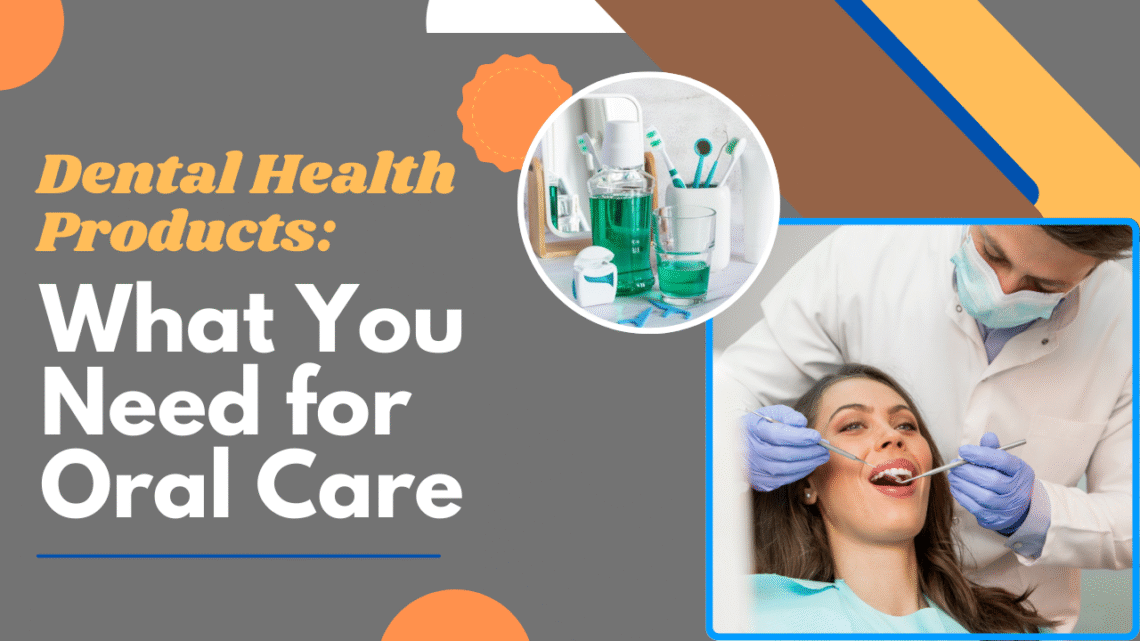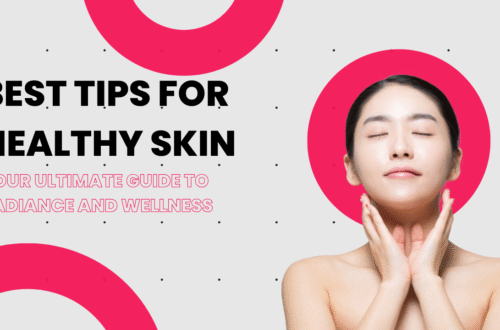A healthy smile is more than just a sign of good hygiene—it’s a reflection of your overall well-being. Proper oral care is essential for preventing tooth decay, gum disease, and even serious health issues like heart disease and diabetes. Beyond daily brushing and flossing, the right dental health products play a key role in keeping your mouth clean and your body healthier.
From toothbrushes and toothpaste to mouthwash, floss, and tongue scrapers, each tool serves a specific purpose in maintaining oral hygiene. Choosing the right dental health products tailored to your needs can enhance your routine, helping you prevent plaque buildup, fight bacteria, and keep your breath fresh.
In this guide, we’ll break down the must-have dental health products, explain how to use them effectively, and provide 8 smart tips to support your oral and overall health. Whether you’re upgrading your routine or just getting started, this is your ultimate dental care resource.
Importance of Oral Health
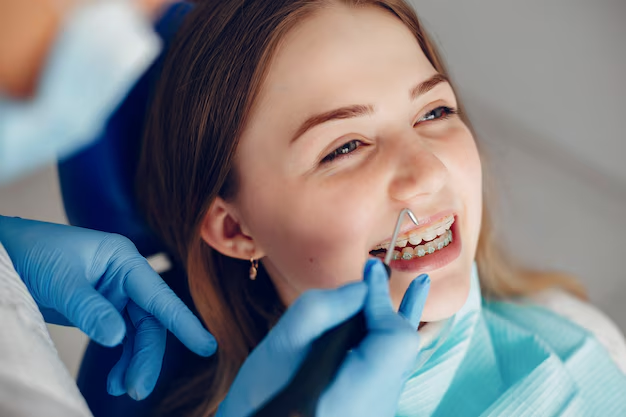
Oral health is deeply connected to your body’s overall wellness. It’s not just about avoiding cavities or keeping your breath fresh—what happens in your mouth can influence the rest of your body. Poor dental hygiene has been linked to serious health issues like heart disease, diabetes, respiratory infections, and even pregnancy complications.
When harmful bacteria from the mouth enter the bloodstream, they can trigger inflammation and contribute to chronic conditions. This is why maintaining good oral hygiene is more important than ever. It’s not just about your teeth—it’s about protecting your total health.
Incorporating the right dental health products into your daily routine—such as fluoride toothpaste, antiseptic mouthwash, and interdental brushes—can make a big difference. These tools help remove plaque, fight bacteria, and keep your gums healthy. Investing in proper dental health products is a simple yet powerful way to support both your oral and overall health.
- Gum disease (periodontitis)
- Tooth decay and loss
- Bad breath (halitosis)
- Heart disease
- Diabetes complications
- Respiratory infections
Practicing good oral hygiene using the right tools ensures your mouth stays healthy, preventing pain, discomfort, and expensive dental treatments.
2. Essential Dental Health Products
Taking care of your oral health requires more than just brushing—it involves a complete routine supported by the right dental health products. Each product plays a specific role in maintaining clean teeth, healthy gums, and fresh breath. By using them consistently, you can prevent common issues like plaque buildup, cavities, and gum disease.
To start, a fluoride toothpaste and a soft-bristled toothbrush are the foundation of daily oral care. Mouthwash adds an extra layer of protection by killing bacteria and reaching areas brushing might miss. Floss or interdental brushes are essential for cleaning between teeth, where food particles often get trapped.
For periodic care, consider tongue scrapers, electric toothbrushes, and water flossers to enhance your routine. These dental health products can improve your cleaning efficiency and help you reach deeper areas of the mouth. Regularly updating and using these tools ensures long-term oral health and overall well-being.
a. Toothbrush
Your toothbrush is the cornerstone of your dental hygiene routine. It helps remove food particles and plaque from your teeth and gums.
Types:
- Manual toothbrush: Inexpensive and effective when used properly.
- Electric toothbrush: Offers consistent brushing motion and is great for people with limited mobility or braces.
Features to look for:
- Soft bristles (gentle on gums)
- Small head (to reach the back teeth)
- Comfortable grip
Replace every 3–4 months or sooner if bristles are frayed.
b. Toothpaste
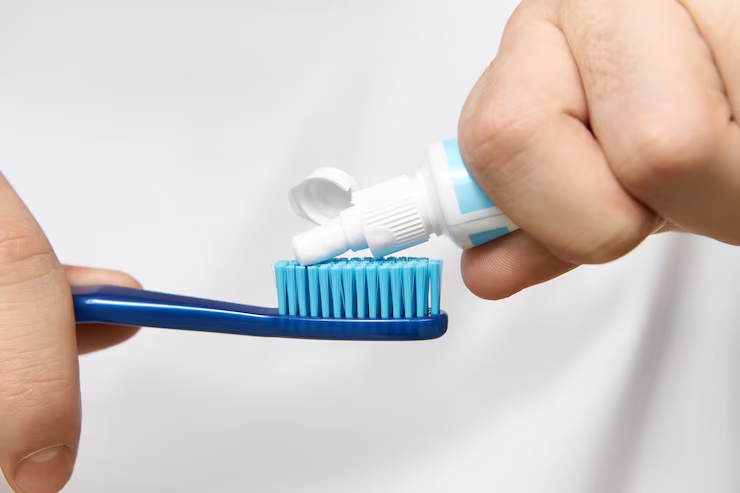
Toothpaste enhances the cleaning power of your toothbrush. It often includes fluoride, which strengthens enamel and prevents cavities.
Types:
- Fluoride toothpaste: Prevents decay.
- Tartar control: Prevents plaque from hardening into tartar.
- Whitening: Contains mild abrasives or bleaching agents.
- Sensitivity: Formulated for sensitive teeth and gums.
Choose a toothpaste with the ADA Seal of Acceptance to ensure it’s safe and effective.
c. Dental Floss
Flossing is crucial for removing plaque and food between teeth where brushes can’t reach.
Types:
- Waxed/unwaxed floss
- Dental tape: Wider and flatter.
- Floss picks: Easier for people with limited dexterity.
- Water flossers: Ideal for braces or gum sensitivity.
Daily flossing helps prevent gum disease and tooth decay between teeth.
d. Mouthwash
Mouthwash freshens breath, kills bacteria, and can provide fluoride or antiseptic benefits.
Types:
- Antiseptic: Contains chlorhexidine or alcohol to kill bacteria.
- Fluoride: Strengthens enamel and prevents decay.
- Cosmetic: Masks bad breath but offers limited oral health benefits.
Use mouthwash after brushing and flossing, not as a substitute.
e. Tongue Scraper
The tongue harbors bacteria that cause bad breath. A tongue scraper helps remove this buildup more effectively than brushing alone.
Daily tongue cleaning can improve taste sensation and oral freshness.
f. Interdental Brushes
These tiny brushes fit between your teeth to clean hard-to-reach areas. Especially useful for people with:
- Braces
- Dental bridges
- Wider gaps between teeth
They’re gentle and very effective at preventing plaque buildup.
g. Fluoride Treatments
Professionally applied fluoride treatments are recommended for people at high risk of cavities. Some over-the-counter fluoride gels and rinses are also available.
Fluoride helps:
- Remineralize enamel
- Slow cavity formation
- Reduce sensitivity
h. Whitening Products
While not essential, many people use whitening products to enhance their smile.
Options:
- Whitening toothpastes
- Whitening strips
- In-office whitening treatments
- Whitening trays and gels
Always consult your dentist before starting any whitening treatment to avoid damaging your enamel or gums.
i. Orthodontic Tools (If Applicable)
If you wear braces or aligners, specialized products like orthodontic floss threaders, wax, and cleaning kits are essential.
3. Top 8 Tips to Stay Healthy (Dental and Overall)
Maintaining oral health goes beyond a bright smile—it’s a vital part of your overall well-being. Your mouth serves as a gateway to your body, and problems here can impact everything from heart health to digestion. That’s why adopting healthy habits is essential not just for your teeth and gums, but for your total body wellness.
Incorporating daily practices such as brushing twice a day, flossing, and rinsing with an antibacterial mouthwash creates a strong foundation. Alongside these habits, using the right dental health products—like fluoride toothpaste, electric toothbrushes, and tongue scrapers—enhances your oral care routine and helps prevent issues before they start.
Beyond oral hygiene, drink plenty of water, eat a balanced diet low in sugar, avoid smoking, and visit your dentist regularly. When paired with the consistent use of dental health products, these 8 tips will support both your dental and overall health for years to come.
1. Brush Twice a Day, Every Day
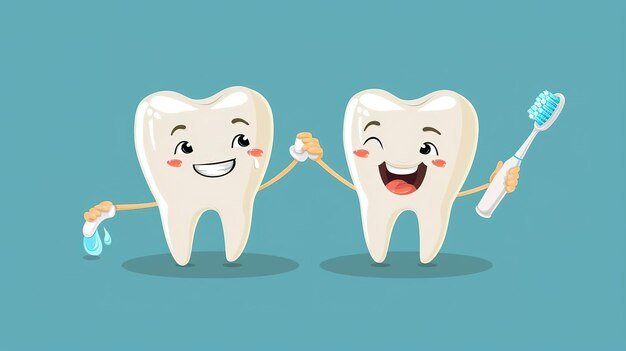
Brushing your teeth properly is one of the most important steps in any oral hygiene routine. To get the most out of it, always use fluoride toothpaste, as fluoride helps strengthen enamel and protects against cavities. It’s a simple yet effective way to safeguard your teeth from decay over time.
Make sure to brush for a full two minutes—rushing through can leave behind plaque and food debris. Focus on covering every surface of your teeth: the front, the back, and the chewing surfaces. Don’t forget to gently brush along the gumline where bacteria often gather.
Investing in quality dental health products like a soft-bristled toothbrush or an electric toothbrush can improve your brushing technique and ensure a thorough clean. These tools, combined with fluoride toothpaste, form a strong first line of defense in maintaining long-term dental and overall health.
Tip: Set a timer or use a toothbrush with a built-in timer.
2. Floss Daily
Flossing is a vital part of oral hygiene that often gets overlooked. While brushing cleans the visible surfaces of your teeth, it can’t reach the tight spaces between them. That’s where flossing comes in—it removes plaque, food particles, and bacteria from areas your toothbrush simply can’t access.
Skipping flossing means you’re missing up to 40% of your tooth surfaces, allowing harmful bacteria to thrive. Over time, this can lead to gum inflammation, cavities between teeth, and even periodontal disease. Daily flossing is a simple step that has a powerful impact on your long-term oral health.
Choosing the right dental health products can make flossing easier and more effective. Whether it’s traditional dental floss, floss picks, or a water flosser, using a product that fits your routine will help ensure you don’t skip this essential step. Consistency, paired with quality products, leads to healthier gums and cleaner teeth.
- Tip: Try floss picks or water flossers if traditional floss is uncomfortable.
3. Visit the Dentist Regularly
Scheduling regular dental check-ups and professional cleanings is essential for maintaining a healthy smile. Visiting your dentist every six months—or as recommended—allows for early detection of issues like cavities, gum disease, and oral cancer. These appointments are more than routine; they’re a preventive step that keeps small problems from becoming costly and painful.
Professional cleanings remove hardened plaque (tartar) that brushing and flossing can’t eliminate. This helps prevent decay, freshens breath, and keeps your gums healthy. Routine exams also give your dentist a chance to assess your oral hygiene habits and suggest improvements.
Incorporating the right dental health products between visits enhances the effectiveness of these appointments. Using electric toothbrushes, fluoride toothpaste, and antibacterial mouthwash ensures your teeth and gums stay in top shape between cleanings. Prevention is always better than treatment, and pairing quality home care with professional check-ups offers the best defense for your oral health.
- Professional cleanings remove tartar that brushing can’t.
- Dentists check for signs of gum disease, decay, or oral cancer.
4. Eat a Tooth-Friendly Diet
What you eat plays a significant role in your oral health. Sugary and acidic foods can erode enamel and fuel the growth of harmful bacteria, leading to cavities, gum disease, and bad breath. On the other hand, a balanced diet supports strong teeth and healthy gums by providing essential nutrients like calcium, vitamin D, and phosphorus.
Crunchy fruits and vegetables like apples, carrots, and celery help clean teeth naturally while stimulating saliva production, which protects against tooth decay. Dairy products like cheese and yogurt are rich in calcium and help strengthen enamel. Water is also crucial—it rinses away food particles and keeps the mouth hydrated.
Complement your diet with the right dental health products to maintain optimal oral hygiene. Using fluoride toothpaste, mouthwash, and floss daily ensures that food doesn’t become a long-term threat to your teeth. Remember: good nutrition and proper oral care go hand in hand for a healthy smile.
- Good foods: Crunchy fruits/vegetables, dairy, leafy greens, nuts.
- Avoid/limit: Sugary snacks, sodas, acidic foods, sticky candies.
- Tip: Drink water after meals to rinse away food particles and acid.
5. Don’t Smoke or Use Tobacco
Tobacco use is one of the most harmful habits for your oral health. Whether smoked or chewed, tobacco introduces harmful chemicals into your mouth that damage gums, stain teeth, and erode tooth enamel. Over time, this leads to chronic bad breath, yellowing teeth, and increased plaque buildup—all of which significantly raise the risk of dental issues.
One of the most serious consequences is gum disease. Tobacco restricts blood flow to the gums, making it harder for your body to fight off infections and heal. This often results in receding gums, tooth mobility, and eventual tooth loss. Additionally, tobacco use is a major risk factor for oral cancer, a life-threatening condition that often goes undetected until it reaches advanced stages.
Quitting tobacco and adopting healthy oral hygiene habits—with the support of quality dental health products—can dramatically improve your mouth’s condition and reduce long-term health risks.
- It stains your teeth, weakens immunity, and delays healing after dental procedures.
6. Use Dental Products with Fluoride
Fluoride is a key ingredient in many dental health products because of its powerful protective properties. It works by remineralizing weakened enamel, helping to rebuild the tooth’s outer surface before cavities can form. This makes teeth more resistant to acid attacks from plaque bacteria and sugary foods.
Regular exposure to fluoride—through toothpaste, mouthwash, or professionally applied treatments—can significantly reduce the risk of tooth decay, especially in children and adults prone to cavities. It’s one of the most researched and proven methods for preventing dental problems and maintaining strong, healthy teeth.
Using fluoride-based dental health products as part of your daily routine helps ensure long-term oral health. When combined with proper brushing and flossing, fluoride becomes a powerful ally in your defense against cavities, making it an essential part of any effective oral care regimen.
- Most toothpaste contains fluoride.
- Consider fluoride mouthwash or professional treatments if prone to cavities.
7. Protect Your Teeth
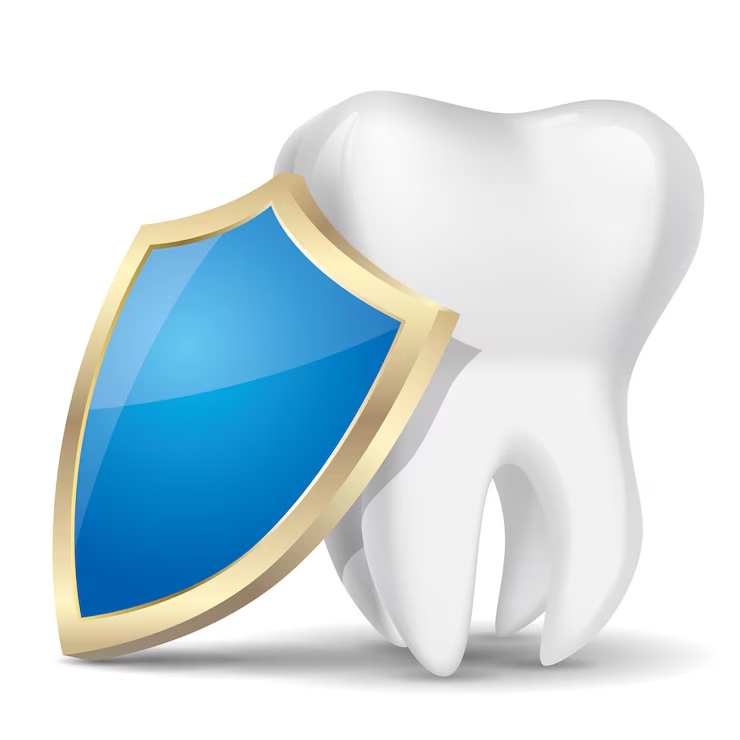
Protective gear is an often-overlooked but essential part of your dental health products arsenal. If you play contact sports or activities where impact is possible, wearing a properly fitted mouthguard can prevent chipped teeth, broken jaws, and even tooth loss. These custom or over-the-counter devices act as shock absorbers, reducing the risk of serious dental injury.
Similarly, if you grind your teeth at night—a condition known as bruxism—a nightguard can make a significant difference. This appliance acts as a barrier between your upper and lower teeth, minimizing damage to enamel, reducing jaw pain, and improving sleep quality.
Including mouthguards and nightguards in your collection of dental health products shows that oral health isn’t just about brushing and flossing. It’s also about prevention and protection. Whether on the field or in bed, safeguarding your teeth can save you pain, time, and costly dental procedures in the future.
8. Hydrate with Wate
Water is one of the most overlooked yet powerful dental health products in your daily routine. Drinking water throughout the day helps rinse away food particles and bacteria that contribute to plaque, bad breath, and tooth decay. Unlike sugary beverages, water doesn’t feed harmful bacteria or erode enamel.
Staying hydrated also supports saliva production, which is essential for oral health. Saliva acts as your mouth’s natural defense system—it neutralizes acids, helps digest food, and delivers minerals to strengthen enamel. Without enough water, dry mouth can occur, increasing your risk of cavities and gum disease.
In addition, water helps maintain your mouth’s pH balance, reducing acidity that can wear down teeth over time. While other dental health products like mouthwash and toothpaste are important, don’t underestimate the power of plain water as a daily tool to protect and preserve your oral health.
- Saliva plays a critical role in neutralizing acids and remineralizing enamel.
4. Additional Oral Care Tips by Age
Oral care isn’t one-size-fits-all—each stage of life brings its own unique dental needs and challenges. Children, for example, require gentle, fun methods to learn proper brushing and flossing techniques, using age-appropriate dental health products that protect their developing teeth and gums.
For adults, maintaining oral wellness means integrating routine professional check-ups with consistent, effective home care. This includes selecting the right dental health products—such as fluoride toothpaste, soft-bristled brushes, and quality mouthwash—to combat daily plaque buildup, prevent cavities, and keep gums healthy amid a busy lifestyle.
Seniors, meanwhile, may face issues such as gum recession or dry mouth and need tailored care to preserve their natural smile. Adapting your oral hygiene routine and dental health products to these changing needs is crucial for sustaining long-term dental health and overall well-being at every age.
Infants and Toddlers
- Wipe gums with a soft cloth after feedings.
- Begin brushing with a soft-bristled toothbrush once teeth erupt.
- Avoid putting babies to bed with bottles (risk of baby bottle tooth decay).
Children (3-12)
- Use a pea-sized amount of fluoride toothpaste.
- Supervise brushing and flossing.
- Consider dental sealants for molars to prevent cavities.
Teens
- Encourage good hygiene during orthodontic treatment.
- Watch out for sugary snacks and sports drinks.
- Maintain regular dental checkups.
Adults
- Continue brushing, flossing, and dental visits.
- Address any signs of gum disease early (bleeding gums, bad breath, recession).
- Limit alcohol and tobacco use.
Seniors
- Watch for dry mouth (often due to medications).
- Maintain regular dental check-ups to preserve existing teeth or dentures.
- Clean dentures properly and soak them overnight.
5. Misconceptions About Oral Care
Let’s bust a few myths:
- Myth: “If my gums bleed, I should stop flossing.”
Truth: Bleeding gums often indicate inflammation. Flossing helps reduce it. - Myth: “Mouthwash replaces brushing.”
Truth: Mouthwash is an addition, not a substitute. - Myth: “Hard brushing cleans better.”
Truth: Hard brushing can damage enamel and gums. Use gentle, circular motions.
6. When to See a Dentist
Early intervention is key. See your dentist if you notice:
- Persistent bad breath
- Bleeding, swollen, or receding gums
- Tooth sensitivity
- Loose teeth
- Mouth sores or lumps
- Jaw pain or clicking
Conclusion: Invest in Your Smile with the Right Dental Health Products
Maintaining excellent oral hygiene is a lifelong commitment—and the right dental health products make all the difference. From childhood to senior years, choosing quality toothpaste, floss, mouthwash, and tools tailored to your needs helps protect against decay, gum disease, and costly treatments down the road.
Remember, your mouth is the gateway to your overall health. A clean, healthy smile isn’t just about appearances—it’s about confidence, comfort, and preventing serious health conditions. Pairing good habits with effective dental health products and regular dental visits sets you up for long-term success.
Small daily choices—like using fluoride toothpaste, flossing, and drinking water—build a strong foundation for oral wellness. So start today. Make your oral care routine a priority, and let your smile reflect the healthy life you’re building.
FAQs
Q1: What are the most essential dental health products I should use daily?
A: At minimum, you should use fluoride toothpaste, a soft-bristled toothbrush, and dental floss. Mouthwash, tongue scrapers, and interdental brushes can further improve your oral hygiene.
Q2: How often should I replace my toothbrush or toothbrush head?
A: Every 3 to 4 months—or sooner if the bristles are frayed. Worn-out brushes are less effective at cleaning teeth and gums.
Q3: Is mouthwash necessary for good oral health?
A: Mouthwash isn’t a substitute for brushing or flossing, but it can help reduce plaque, freshen breath, and kill harmful bacteria—especially when using a therapeutic or fluoride rinse.
Q4: Are electric toothbrushes better than manual ones?
A: Electric toothbrushes can be more effective at reducing plaque and gingivitis, especially for people who have trouble brushing thoroughly with a manual brush.
Q5: What type of toothpaste is best for sensitive teeth?
A: Look for toothpaste labeled “for sensitive teeth.” These contain ingredients like potassium nitrate or stannous fluoride that help block pain signals from the tooth surface to the nerve.
Q6: How do I know which dental health products are safe and effective?
A: Choose products that are approved by dental associations, such as those with the ADA (American Dental Association) Seal of Acceptance or your local dental board’s certification.
Q7: Can dental health products help prevent gum disease?
A: Yes. Using antibacterial toothpaste and mouthwash, along with proper brushing and flossing, helps reduce plaque buildup and keeps gums healthy.
Q8: Should kids use the same dental health products as adults?
A: No. Children need age-appropriate products—like smaller toothbrushes and lower-fluoride toothpaste—to ensure safety and effectiveness based on their dental development.
Dental Health Products: Essentials for a Brighter Smile
